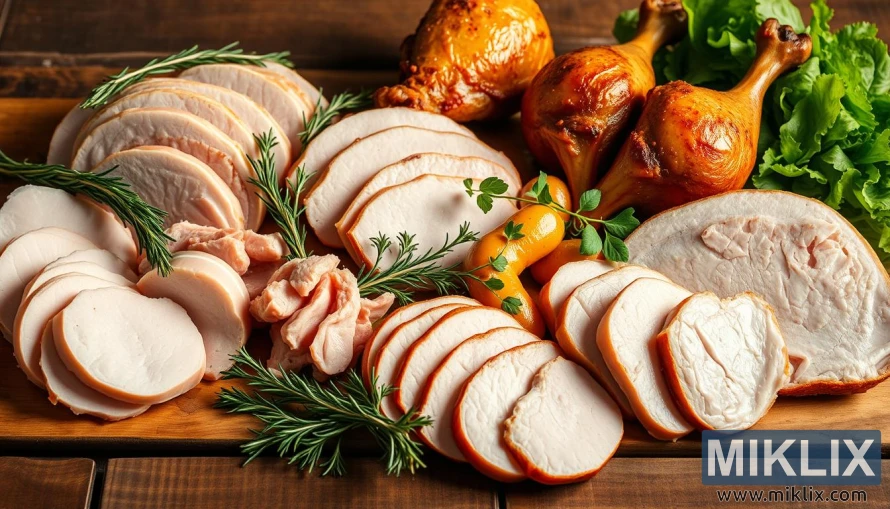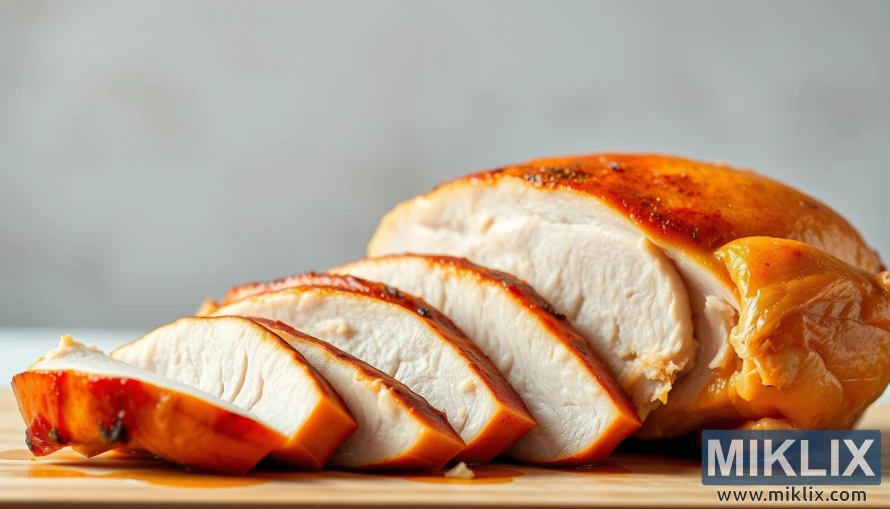Gobble Up Good Health: Why Turkey is a Super Meat
Published: May 15, 2025 at 1:15:59 PM UTC
Last updated: December 24, 2025 at 3:12:05 PM UTC
Turkey meat is a favorite in many American homes. In 2023, Americans ate about 4.96 billion pounds of it. This is about 14.8 pounds per person. This rise shows more people are choosing healthier foods. Turkey is not just high in protein. It also has important vitamins and minerals. As people pick turkey over red meat, knowing its health benefits is key. This helps them make better food choices.

Key Takeaways
- Turkey is a popular, lean protein source in the U.S.
- Consumption of turkey meat has significantly increased over the years.
- Rich in essential nutrients, turkey provides various health benefits.
- Choosing turkey over red meat can lead to healthier meal options.
- Understanding the nutritional value of turkey aids in dietary planning.
- Turkey is beneficial for a variety of health conditions, including heart health.
Introduction to Turkey as a Healthy Meat Option
Turkey is a top choice for healthy meat because it's low in fat and full of nutrients. It's a lean protein that offers many benefits. Turkey is rich in B vitamins like niacin and vitamin B6, and minerals like selenium. These nutrients are important for staying healthy.
Turkey has a long history in American food, most famously at Thanksgiving. Now, it's a favorite all year round for those who care about their health. Eating turkey means you can enjoy tasty food and get its health perks.
Why Choose Turkey over Red Meat?
Choosing turkey over red meat can boost your health. Turkey has less saturated fats and cholesterol. This helps lower heart disease risks, making it a smart choice for those who care about their health.
Turkey also brings many essential nutrients to the table. It's low in calories but high in protein. This makes it perfect for those who want to eat more protein without gaining weight.
In short, turkey is good for your heart and packed with nutrients. Adding turkey to your meals can lead to better health and a balanced diet.
Nutrition Profile of Turkey
Turkey is a nutritional powerhouse, making it a favorite for those who care about their health. A 3-ounce serving of roasted turkey without skin has about 135 calories. It also has 25 grams of protein, 3 grams of fat, and no carbs or sugar.
This high protein content is great for building and repairing muscles. It's a key part of many diets.
Looking at turkey's nutrition facts, we see it's packed with important nutrients. It's full of B vitamins like niacin, B6, and B12. These vitamins help with energy and keeping nerves healthy.
Also, turkey has selenium, phosphorus, and zinc. These minerals help with the immune system and bone health.
Health Benefits of Turkey Meat
Turkey is packed with health benefits, making it a top choice for many diets. Its high-quality protein is key for muscle health and growth. Turkey is also low in fat, helping with weight control and keeping you full without too many calories.
Eating turkey can boost your overall health thanks to its nutrient-rich profile. It's a good source of B vitamins like niacin and B6, which are vital for energy and brain health. Turkey also has selenium and phosphorus, supporting your immune system and bones.
Choosing turkey as your protein means you get a versatile ingredient for tasty meals. It's a smart choice for better health and a balanced lifestyle.

Reduced Risk of Cancer
Turkey is packed with health benefits, including fighting cancer. It's rich in selenium, a mineral that helps lower cancer risk. This includes cancers of the bladder, breast, lung, and stomach. Food selenium is better than supplements for these benefits.
Eating turkey can make your meals tasty and healthy. It's a great way to get selenium. Turkey's benefits for cancer prevention are:
- Rich source of selenium
- Potential protective effects against certain types of cancer
- Affordable, versatile meat option
Choosing turkey as a protein can boost your health. It's not just about fighting cancer. Turkey is good for a balanced diet.
Turkey and Diabetes Management
Turkey is great for managing diabetes. It has a lot of protein, which helps keep blood sugar stable. Many people find it helps a lot when they eat it as part of a balanced meal.
Adding turkey to your meals can be smart. It doesn't cause blood sugar to rise quickly, which is good for diabetes control. Turkey's protein helps build muscle and keeps energy up all day.
Using turkey to manage diabetes can make cooking fun. You can grill, roast, or shred it for salads. Turkey is a flexible protein that fits many diets. It makes it easy to enjoy tasty meals while managing diabetes.
Heart Health Benefits of Turkey
Eating turkey can greatly help your heart health. It's a lean meat that's full of good nutrients and has very little saturated fat. Unlike red meats, turkey doesn't raise LDL cholesterol levels, which is good for your heart.
Turkey is great for your heart because of its healthy ingredients. Eating it often can lower the chance of heart attacks and strokes. This makes turkey a good choice for anyone wanting to keep their heart healthy. Plus, you can enjoy tasty meals without worrying about your health.
Turkey's Role in Cognitive Health
Eating turkey can boost your brain health. It's full of nutrients that help your brain work better. Studies show that turkey might help older adults remember things better.
Turkey can also help prevent diseases like Alzheimer's. It's a key part of the MIND diet, which is good for your brain. This diet includes foods that are great for your brain and reduce memory loss.
Adding turkey to your meals can improve your brain function. Turkey's lean protein and other nutrients help keep your memory sharp as you get older. Trying turkey in your diet can help protect your memory.
Turkey as a Source of Essential Amino Acids
Turkey is known for its essential amino acids, making it a top choice for better diets. It's not just tasty but also helps with muscle building. Tryptophan in turkey is key for muscle health and growth.
Eating turkey can boost turkey protein benefits for those who exercise a lot. Its amino acids help repair and grow muscles. This is great for athletes and anyone trying to get stronger.
For turkey for muscle building, pick lean cuts with less fat and more protein. These cuts give the body what it needs to build lean muscle. Adding turkey to meals with other nutrients makes for a great diet and fitness plan.

Processing and Preparation of Turkey Meat
The way turkey is prepared greatly affects its nutritional value. Many processed turkey products have more sodium and added fats. Choosing fresh, unprocessed turkey boosts your diet's health benefits.
There are many ways to prepare turkey that are both tasty and healthy. Roasting or slow-cooking turkey without extra oils or fats is a great choice. It makes the turkey both healthy and flavorful. Here are some tips for cooking turkey in a healthy way:
- Use herbs and spices to add flavor without extra calories.
- Marinate turkey in lemon juice or vinegar-based sauces to make it tender.
- Cook turkey to the right internal temperature for safety and to keep it moist.
Being careful about how turkey is processed and cooked can greatly improve your diet. It lets you enjoy this versatile meat while staying healthy.
Choosing the Right Cut of Turkey
Choosing the right turkey cut is key to getting the most health benefits. Skinless turkey breast is a top pick because it's low in fat and calories. It's perfect for those watching their weight or eating healthily.
Dark meat, on the other hand, has a richer taste and is juicier. It has more fat and calories, making it great for a filling meal. When deciding between turkey breast and dark meat, think about what you want to achieve and what you like to eat.
Finding the right balance between taste and health can help you find your favorite turkey cuts. Whether you choose turkey breast or dark meat, adding turkey to your meals can boost both flavor and nutrition.
Healthy Cooking Methods for Turkey
Cooking turkey can be both nutritious and delicious with the right methods. Roasting, grilling, and slow-cooking are great ways to cook turkey. They keep its flavor and nutrients intact. These methods let the turkey's natural taste shine without adding unhealthy fats.
When cooking turkey, avoid frying to keep it healthy. Frying adds a lot of fat, making the dish less good for you. Instead, use fresh herbs and spices to add flavor. These options are better for your heart and make cooking more fun.
- Roasting: A classic approach that keeps the meat juicy while allowing for a crispy skin without frying.
- Grilling: A fun way to get a smoky flavor while cooking off excess fat.
- Slow-Cooking: Perfect for tender, flavorful turkey that requires minimal supervision.
Using these healthy cooking methods makes cooking turkey a joy. Try different herbs and spices to find new flavors. This way, you can enjoy a delicious and healthy turkey meal.

Delicious Turkey Recipe Ideas
There are countless ways to make delicious dishes with turkey. These ideas will please everyone in your family. Here are some tasty turkey recipes to try:
- Turkey and cheese quesadillas, perfect for a quick lunch or dinner.
- Hearty turkey soup with brown rice, packed with nutrients and flavor.
- Classic turkey Caesar salad, ideal for a light yet satisfying meal.
- Comforting turkey pot pie, a favorite during colder months.
- Turkey and cranberry sauce sandwiches, a delightful twist on leftovers.
- Spicy turkey chili, great for gatherings or cozy nights in.
These recipes show how versatile turkey can be. They offer healthy, tasty options for any meal. You can adjust each recipe to fit your taste, making turkey a great choice for any occasion.
Portion Control and Turkey Consumption
Turkey is a healthy choice, but it's important to control portions. The right serving size is about 3 ounces. This helps keep calorie intake in check. Enjoying turkey in moderation keeps your diet balanced without losing flavor.
How you cook turkey matters too. Turkey with skin or too much oil has more calories. Eating it in moderation lets you enjoy its taste while staying healthy. Here are some tips for portion control:
- Measure out servings using a kitchen scale or measuring cup.
- Pair turkey with plenty of vegetables for a well-rounded meal.
- Limit high-calorie sauces or toppings to enhance your dish without overdoing it.
By following these tips, you can enjoy turkey's benefits while keeping moderation in mind. Whether it's for a big event or a simple dinner, portion control helps make turkey a part of a healthy lifestyle.

Potential Drawbacks of Eating Turkey Meat
Turkey can be a good choice for a healthy protein. But, there are some downsides to consider. Processed turkey products often have a lot of sodium. This can be bad, mainly for people with high blood pressure.
Too much sodium can cause serious health problems. It's also important to think about the balance in your diet. Eating too much turkey and not enough other proteins can lead to nutrient imbalances. It's key to eat a variety of proteins to get all the vitamins and minerals you need.
- High sodium content in processed turkey products.
- Potential turkey issues related to over-reliance on a single protein source.
- Risk of nutrient imbalances in the overall diet.
Conclusion
Turkey is a great choice for a healthy diet. It's low in fat and high in protein. This makes it good for muscle health and gives us important nutrients.
Eating turkey can help your heart and help you manage your weight. It might even lower the risk of chronic diseases. Choose unprocessed turkey and cook it healthily to get the most benefits.
Turkey is versatile and adds value to our meals. It's perfect for a roast or a salad. Adding turkey to your diet can make your meals healthier without losing flavor.
Further Reading
If you enjoyed this post, you may also like these suggestions:
- From Muscle Fuel to Immune Boost: The Surprising Benefits of Whey Protein Explained
- Bittersweet Bliss: The Surprising Health Perks of Dark Chocolate
- Turmeric Power: The Ancient Superfood Backed by Modern Science
